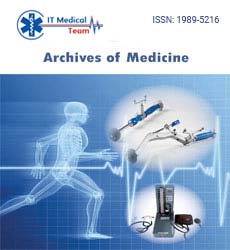Commentary - (2024) Volume 16, Issue 5
The power of immunology: How our immune system defends against disease
Wei Zhang*,
Lijuan Chen and
Yong Huang
Department of Immunology, Peking University Health Science Center, Haidian District, Beijing 100191, China
*Correspondence:
Wei Zhang, Department of Immunology, Peking University Health Science Center, Haidian District, Beijing 100191,
China,
Email:
Received: 19-Aug-2024, Manuscript No. ipaom-24-15399;
Editor assigned: 21-Aug-2024, Pre QC No. P-15399;
Reviewed: 02-Sep-2024, QC No. Q-15399;
Revised: 09-Sep-2024, Manuscript No. R-15399;
Published:
16-Sep-2024
Introduction
Immunology is the branch of biomedical science that focuses on the immune system, a complex network of cells, tissues, and organs that work together to defend the body against pathogens such as bacteria, viruses, and parasites. The immune system plays a critical role in maintaining health, recognizing harmful invaders, and orchestrating responses to eliminate them. Recent advances in immunology have unveiled the remarkable capabilities of our immune defenses, revealing not only how they protect us from disease but also how they can be harnessed to develop innovative therapies and vaccines [1]. Understanding the intricacies of the immune response is essential for addressing various health challenges, including infectious diseases, autoimmune disorders, and cancers. This article explores the power of immunology, highlighting the mechanisms by which our immune system defends against disease and the promising developments that stem from this field.
Description
The immune system operates through a sophisticated interplay of innate and adaptive immunity. Innate immunity serves as the body’s first line of defense, providing a rapid response to a wide range of pathogens. This system includes physical barriers like the skin and mucous membranes, as well as immune cells such as macrophages and neutrophils that identify and engulf invaders [2]. These cells not only respond quickly to infections but also produce signaling molecules called cytokines that recruit additional immune components to the site of infection. Adaptive immunity, on the other hand, develops over time and is characterized by its ability to remember specific pathogens. This process is mediated by specialized immune cells, including B cells and T cells. B cells produce antibodies, proteins that specifically target and neutralize pathogens, while T cells recognize and destroy infected cells [3]. The memory of these cells enables the immune system to mount a more efficient and effective response upon subsequent exposures to the same pathogen, forming the basis for vaccination strategies.
Recent breakthroughs in immunology have significantly expanded our understanding of the immune response and its applications. For instance, the development of monoclonal antibodies has revolutionized the treatment of various diseases, including cancers and autoimmune disorders. These engineered antibodies can precisely target specific cells, providing a powerful therapeutic option with fewer side effects compared to traditional treatments. Moreover, advancements in vaccine technology, such as mRNA vaccines, have demonstrated the potential to rapidly respond to emerging infectious diseases. The success of mRNA vaccines against COVID-19 exemplifies how immunology can be leveraged to create effective prevention strategies, showcasing the importance of ongoing research in this field [4].
In addition to these developments, the field of immunology is increasingly exploring the concept of immunotherapy, which aims to harness and enhance the body’s own immune responses to treat diseases. Techniques such as CAR T-cell therapy, where patients' T cells are genetically modified to better attack cancer cells, have shown remarkable promise in treating certain types of cancers. These innovative approaches highlight the potential of using the immune system as a powerful ally in the fight against various diseases, further emphasizing the importance of immunological research in developing effective and targeted therapies. The exploration of the microbiome—the collection of microorganisms living in and on our bodies—has also opened new avenues for understanding immune function. Research indicates that the microbiome plays a crucial role in shaping the immune response, influencing susceptibility to infections and autoimmune diseases. This emerging field underscores the complexity of immune regulation and highlights the need for a holistic approach to health [5].
Conclusion
The power of immunology lies in its ability to reveal the intricate mechanisms by which our immune system defends against disease and maintains health. Through a sophisticated interplay of innate and adaptive responses, the immune system can identify and neutralize a wide array of pathogens, providing critical protection against infections and other health challenges. Recent advancements in immunological research have not only enhanced our understanding of these processes but have also led to groundbreaking therapies and innovative vaccine technologies that hold great promise for the future of medicine. As we continue to explore the depths of immunology, the potential for new discoveries that could transform healthcare remains vast. Understanding the immune system's capabilities offers invaluable insights for developing effective treatments for infectious diseases, autoimmune disorders, and cancers. Moreover, the interplay between the immune system and other biological systems, such as the microbiome, highlights the importance of a comprehensive approach to health and disease prevention.
By harnessing the power of immunology, we can improve health outcomes and enhance our ability to combat disease. As research in this field progresses, it is imperative to invest in understanding the immune system further, paving the way for innovative solutions that promote a healthier future for all.
Acknowledgment
None.
Conflict of Interest
None.
References
- Wolf P. The nature and significance of platelet products in human plasma. Br J Haematol. 1967;13(3):269-88.
Google Scholar, Crossref, Indexed at
- Gibson RK, Peberdy JF. Fine structure of protoplasts of Aspergillusnidulans. J Gen Microbiol. 1972;72(3):529-38.
Google Scholar, Crossref, Indexed at
- Yáñez-Mó M, Siljander PR, Andreu Z, et al. Biological properties of extracellular vesicles and their physiological functions. J Extracell Vesicles. 2015 1;4(1):27066.
Google Scholar, Crossref, Indexed at
- Liu M, Bruni GO, Taylor CM, et al. Comparative genome-wide analysis of extracellular small RNAs from the mucormycosis pathogen Rhizopus delemar. Sci Rep. 2018 27;8(1):5243.
Google Scholar, Crossref, Indexed at
- de Paula RG, Antoniêto AC, Nogueira KM, et al. Extracellular vesicles carry cellulases in the industrial fungus Trichoderma reesei. Biotechnol Biofuels. 2019 Dec;12:1-4.
Google Scholar, Crossref, Indexed at






